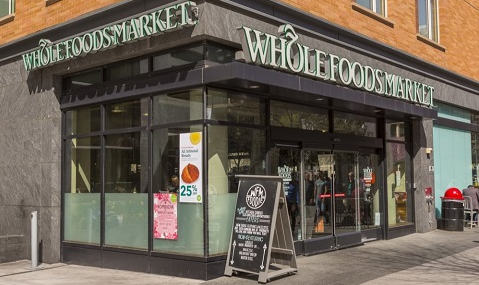Whole Foods CEO Open to Legal Marijuana Sales in U.S. Supermarkets
During an interview with the Texas Tribune, John Mackey, CEO of the organic grocery chain Whole Foods, stated that he is not opposed to the idea of selling legal marijuana in his stores, provided that the plant is legalized in Texas, where the company’s headquarters are located.
“If the state legislature legalizes marijuana, I wouldn’t rule out the possibility of the plant becoming available in Whole Foods stores, as well as in other private and chain supermarkets,” Mackey said in the interview. “The fact is, as laws change, so does public perception of the plant and related products. It’s possible that marijuana could become a socially acceptable recreational product, sold in grocery stores like cigarettes or beer.”
Mackey’s comments came as part of a broader response to a question about whether he would allow the sale of insect-based foods in his stores as an “alternative natural protein source.” (For reference, Mackey also does not rule out selling such products if there is enough demand.) In other words, Mackey did not announce any immediate plans for his company to enter the marijuana business. He simply noted that if marijuana is legalized in the company’s home state, its leadership might consider adding marijuana and related products to the stores’ assortment.
“I’m not saying that’s definitely what will happen,” he added. “After all, public attitudes toward recreational marijuana use are changing rapidly, as are the laws regarding its production, sale, and consumption.”
Whole Foods’ History with Cannabis-Related Products
It’s worth noting that Mackey has previously expressed support for marijuana reforms. In a 2013 interview with Mother Jones magazine, he described his political views as “classically liberal,” specifically mentioning that he is not opposed to the legalization and regulation of the production and sale of soft drugs, including marijuana.
Additionally, Whole Foods has been selling products like CBD extracts from industrial hemp and various foods containing hemp seeds nationwide for several years. Earlier this year, the company named foods containing hemp seeds and non-psychoactive hemp extracts as “one of the top healthy eating trends of 2019.”
“Although major media outlets have been slow to discuss the nutritional value of such foods, this trend has been rapidly gaining momentum across the country for several years, thanks to bloggers, journalists, and word of mouth,” Mackey said.
Regulatory Challenges and Market Trends
It’s important to note that even in states where marijuana is fully legalized, its production and distribution are strictly regulated, typically limiting sales to a small number of specialized stores. Despite medical reforms in half the states, major online retailers like Amazon (which owns the Whole Foods brand) have so far avoided selling CBD foods and extracts, even though they are technically legal. On the other hand, Amazon’s European division has begun experimenting with limited sales of pharmaceutical products and therapeutic cannabis, suggesting that if sweeping marijuana reforms occur at the federal level, Whole Foods could potentially become a regional authorized seller of cannabis products in North America.
Some other organizations have already formally expressed their interest in entering the marijuana market to regional and federal authorities. For example, in early February, the National Association of Convenience Stores, representing small, independent grocery stores across the country, requested formal permission from New York Governor Andrew Cuomo to sell marijuana cigarettes in member stores located in the state. As New York moves closer to full legalization, state authorities have been inundated with similar requests from other commercial and public organizations seeking a share of the potentially huge recreational marijuana market. The association argues that its members already have experience handling regulated substances like alcohol and tobacco, and that certifying such stores to sell marijuana would help increase the participation of various ethnic minority groups in the future market.
The Situation in Texas
Unfortunately, Texas remains an “outsider” in the regional reform process due to the influence of conservative politicians. However, even Texas has begun to open up to reform, thanks to growing public support for the legalization of medical and recreational marijuana. Currently, the Texas legislature and senate are considering 27 different bills aimed at decriminalizing personal marijuana use and legalizing its limited therapeutic use. After several setbacks, local supporters of medical reform succeeded in passing a law legalizing the use of marijuana oil extracts for medical purposes at the end of 2015.



